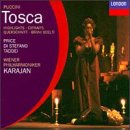| All Artists: Puccini, Price, Di Stefano, Karajan Title: Puccini: Tosca (Highlights) / Karajan, Price Members Wishing: 0 Total Copies: 0 Label: Polygram Records Release Date: 9/16/1997 Genre: Classical Styles: Opera & Classical Vocal, Historical Periods, Modern, 20th, & 21st Century Number of Discs: 1 SwapaCD Credits: 1 UPC: 028945272825 |
Search - Puccini, Price, Di Stefano :: Puccini: Tosca (Highlights) / Karajan, Price
 | Puccini, Price, Di Stefano Puccini: Tosca (Highlights) / Karajan, Price Genre: Classical
|
Larger Image |
CD Details |
CD ReviewsLeontyne Price's TOSCA Regina in Highlights!! Donizetti's Kid | NYC, NY United States | 08/06/2006 (5 out of 5 stars) "A "Highlights" disc for this particular Opera seems a bit perverse, because the drama is such a cohesive one that only one obvious moment impedes said drama (Vissi D'arte) - which, ironically (but quite understandably) is included on this disc. Having expressed that opinion, the selections here give the listener a healthy sampling of TOSCA's riches. The review below pertains to the complete recording from which these highlights were culled.
TOSCA For my money there are many wonderful Tosca performances with numerous individual portrayals of the heroine?!? There are, however,(2) two essential ones: TOSCA DIVINA,the incomparable Greek-American Maria Callas, and TOSCA REGINA, the glorious African-American Leontyne Price. Both sopranos have recorded the opera twice commercially, with the general concensus being that each one's 'prima' was the best of the (2)two...debatable I know. DIVINA electrifies with artistic nuances, coupled with dramatic and daring (indeed, heedless) vocalism that no one else will ever duplicate. Such intuitive artistry must not be quarrelled with. I Love it! REGINA revels in a sound so singularly gorgeous, rich, vibrant, and characterful, that it is hard to fault the diminution of the drama DIVINA brings to the role. Ms. Price creates a more subtle, feminine, feline Tosca, who purrs rather than snarls, and who's more fearful than furious when confronted by Scarpia during the 'torture scene', and the scenes that follow. While both divas express their contempt for the Police Chief with relish ("Quanto?..il prezzo?!), Price's Tosca seems more desperate and exhausted while killing Scarpia, contrasted with the exultant and wonderfully malevolent one Callas gives us. Both interpretations are valid, though I could not imagine that scene without Ms. Callas' almost boastful exclamations. "Vissi d'arte" -however unimportant to the drama- is still one of Puccini's most poignant and beautiful arias. Both divas ably express the aria's pathos, but it is Ms. Price who gives one of the most vocally sumptuous readings ever recorded. Certo REGINA!!! Maestro Herbert Von Karajan, whose idiosyncratic musical genius is much evidenced in the Symphonic realm, was also an outstanding Opera conductor as well. He imbues this TOSCA with a lush, colorful, and immediate ambience that allows his singers to find the drama that is individual to their musical selves. His rapport with the justly-famed VPO is obvious by the unbelievable sonorities he elicits from them throughout the opera. That rapport is just as apparent with Leontyne Price, who he championed early in her spectacular career, as she is more than usually alert dramatically in this performance. Sadly, he is unable to resuscitate the 'dying' vocal splendor of the once-great Giuseppe Di Stefano. Blessed early with a marvelous instrument(and heard to much better advantage in the DIVINA performance), the tenor must resort to much hectoring, howling, and hollering to meet the dramatic AND vocal demands of his role. His soft singing, while often lovely and effective,is a blatant croon. Rarely in this performance will you find a real legato from the tenor, which mars both "E lucevan le stelle" and "O dolci mani". However, he is a truly ardent and passionate Cavaradossi,convincing in his duets with Tosca. Baritone Giuseppe Taddei's portrayal of the Baron Scarpia is vocally graceless, the interprtation lewd, loud, and little else. That is a totally acceptable interpretation of the role, but quite unsatisfactory for this listener. Though he has, like DIVINA and REGINA, recorded his role twice, neither version differs much in his approach dramatically, while his vocal beauty is more apparent in the earlier release.[Baritone Tito Gobbi, on the other hand,is the voice of urbane subtlety in both of his recordings with DIVINA, masking the brutality that is intrinsic to Scarpia's persona.] Sonically, this recording is superb, balancing the thrilling horns, opulent-sounding strings, and rumbling timpani of the sublime orchestra with plaintive clarity of the Act III bells or the majestic organ in the "Te Deum". The orchestral playing is unsurpassed on any recording. The comprimarios for the most part, sing with distinction, notably Piero de Palma. At no point during this performance, do Price, Di Stefano, or Taddei fail to generate a palpable chemistry(Von Karajan again perhaps),and collectively exude the excitement of Puccini's "shabby little shocker". The combination of an outstanding Tosca, masterful conductor, and glorious sonorities of the magnificent Vienna Philharmonic orchestra should motivate even the fans of the great Tebaldi(another superior Floria), sublime Caballe, or any number of other Toscas to own and treasure the TOSCA REGINA of Leontyne Price" |

 Track Listings (13) - Disc #1
Track Listings (13) - Disc #1